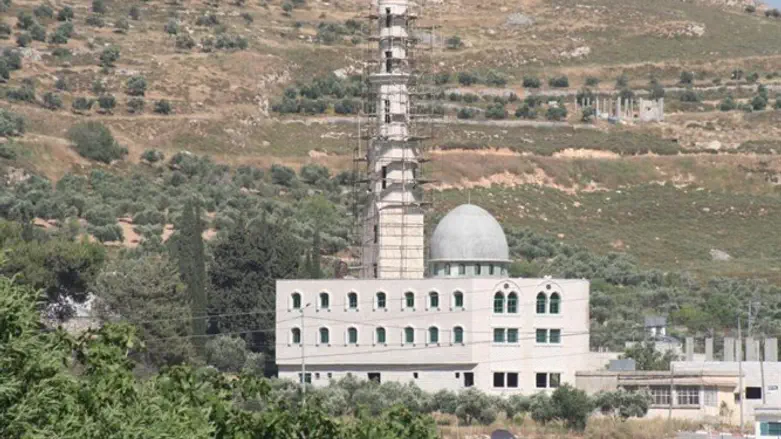
For years, the State of Israel has refrained from enforcing the law regarding the illegal mosque in the Samarian village of Burin.
The mosque stands on privately-owned land, and was built without the owners' permission.
Recently, the Supreme Court rejected a second petition filed by Regavim that called for immediate law enforcement against the illegal structure. Immediately afterwards, the Burin Village Council quickly renewed construction activity at the site, which had been frozen pending the Court's ruling.
Burin, an Arab village situated between the Jewish communities of Har Bracha and Yitzhar in the Shomron, straddles Route 60, the main traffic artery that traverses all of Judea and Samaria, from Be'er Sheva in the south to Afula in the north.
Construction of the illegal mosque, only a few dozen meters off Route 60 at the Yitzhar Junction, began around a decade ago.
In 2011, when Regavim first submitted a petition to the Supreme Court against the project, the State's response included a commitment to seal the mosque and preclude its completion.
Later, the Supreme Court issued an interim injunction freezing enforcement activity, and in 2014 required the village council to submit, within two months, a plan to register and legalize the mosque, which would necessarily include proof of ownership of the land on which it stands.
The plot of land is owned jointly by dozens of heirs, of which only a very small fraction have any possible connection to the villagers of Burin. No permission to use the land has ever been granted by the majority of these owners. Since the original Supreme Court decision was handed down, many years have elapsed, and the village council has failed to submit a plan or proof of ownership.
It should be noted that, in cases if illegal construction carried out without the consent of the landowner, the Supreme Court has, in a number of cases, set a very high and inflexible standard for law enforcement, including precise and immediate timetables for demolition.
In the case of nine houses in Ofra, the Supreme Court required the destruction of homes situated on privately-owned land, despite the fact, which came to light in the course of the legal proceedings, that the Arabs who filed the petition jointly with "Betzelem" and "Yesh Din" were not, in fact, the lawful owners of the land on which the houses were built.
Based on the precedent of the Ofra case, and because the State of Israel had not taken action to seal the mosque as it had committed to do in 2011, Regavim - which, like the left-wing organizations involved in the Ofra case, is categorized as a "public petitioner" - submitted a second petition, this time calling for law enforcement measures against the illegal mosque to be carried out. Recently, the Supreme Court rejected this appeal.
"In this case, and because the land in question is privately owned by Palestinians who have no connection to the petitioners, we find no grounds under accepted legal parameters for intervening at the present time," Justices Fogelman, Mazuz, and Groskopf wrote in their decision. "This Court's decision states that as a rule it does not see fit to intervene in law enforcement's prioritization of cases in this region, other than in cases where law enforcement responsibilities have been shirked."
Only a few days after Regavim's petition was denied, photos of renewed construction, renovation and expansion work at the illegal mosque were posted on the Burin Village Council's official website.
"The High Court of Justice has sent a clear message of inequality before the law: Arabs who build illegally on privately-owned land will not be treated with the same iron fist of law enforcement as are Jews in similar cases," Regavim attorney Boaz Arzi said.
"In addition, the High Court of Justice blatantly discriminates between the legal standing of Regavim as a public petitioner and extreme-left organizations who were granted a final judgement in their petition in the Ofra case, despite the fact that the latter also had no connection to the land in question."